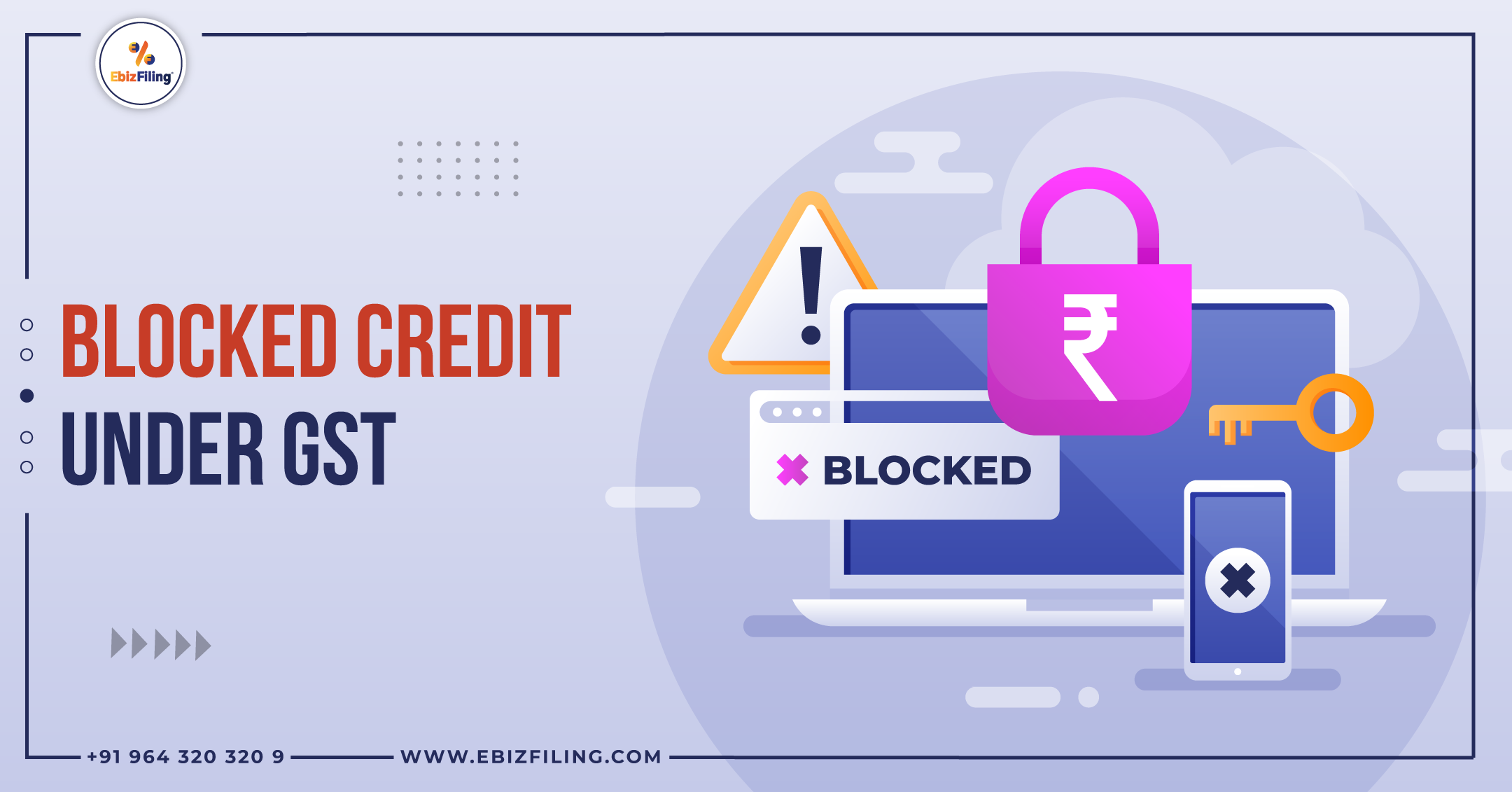
What is Blocked Credit Under GST (Goods and Services Tax)?
Introduction
The Goods and Services Tax (GST) system in India has undoubtedly simplified taxation by replacing a web of indirect taxes with a unified framework. One of the significant advantages of GST is the seamless flow of input tax credit (ITC) across the supply chain. However, there are instances where businesses find themselves dealing with blocked credit which can be a source of confusion and financial concern. In this blog, we will delve into the concept of blocked credit under GST, exploring the reasons behind it, and understanding how businesses can manage and mitigate its impact.
What is Input Tax Credit (ITC)?
GST allows registered businesses to claim credit for the taxes paid on inputs and services used in the course of their business. This means that when you pay GST on your purchases, you can offset that amount against the GST you collect from your customers, reducing your overall tax liability. This mechanism is known as ITC under GST.
What is Blocked Credit under GST?
Blocked credit in GST refers to the portion of input tax credits in GST that a registered taxpayer cannot claim for specific inputs or services. In other words, it’s the unclaimed or unusable credit that cannot be used to reduce the output tax liability. There are several reasons why credit might be blocked under the GST system.
What are the Reasons for Blocked Credit under GST?
-
Non-GST Supplies: GST applies to the supply of goods and services, and not all transactions fall under its purview. When a business makes purchases from a non-GST registered vendor or from a composition dealer, they are not eligible to claim input tax credit on those transactions.
-
Personal Use or Exempt Supplies: If goods or services are used for personal consumption or are for supplies that are exempt from GST, ITC under GST is not allowed. For example, if a company purchases vehicles primarily for personal use, the credit on the GST paid for these vehicles will be blocked.
-
Blocked Services: Certain services are explicitly listed as blocked services under GST. Businesses cannot claim input tax credits in GST on expenses related to these services. Examples of blocked services include catering services, health insurance for employees, and more.
-
Capital Goods for Non-Taxable Supplies: If capital goods are acquired for non-taxable supplies, the input tax credit on these capital goods will be blocked. For instance, if a business purchases machinery for a non-GST taxable business division, it cannot claim ITC on the GST paid for that machinery.
-
Composition Scheme: Businesses that opt for the composition scheme under GST are not eligible to claim the input tax credits in GST. This is because composition scheme taxpayers are subject to a lower GST rate, but they are also barred from collecting GST from their customers or claiming input tax credits in GST.
-
Blocked Credit Due to Non-Compliance: One of the critical reasons for blocked credit is non-compliance with GST regulations. If a business fails to file its returns on time, or if there are discrepancies in its returns, the authorities may block its credit until the issues are resolved.
What are the Impacts of Blocked Credit under GST?
While blocked credit in GST can pose challenges for businesses, there are strategies to mitigate its impact:
-
Maintain Accurate Records: Accurate record-keeping is crucial to identify and address blocked credit under GST. Keep detailed records of all transactions and ensure that all supporting documentation is readily available.
-
Regularly Reconcile Input and Output Taxes: Frequent reconciliation of input and output taxes can help identify discrepancies and rectify them promptly. This will minimize the impact of blocked credit due to non-compliance.
-
Optimize Procurement Practices: Evaluate procurement practices to ensure that you are not purchasing goods or services that result in blocked credit. Consider sourcing from GST-registered vendors whenever possible.
-
Review Business Structure: In some cases, restructuring the business or its divisions may help mitigate blocked credit in GST. Consult with tax experts to explore options that align with your business objectives.
Conclusion
Blocked credit is a concept within the GST system that can have a significant impact on a business’s finances. Understanding the reasons for blocked credit under GST and taking proactive steps to mitigate its impact is crucial for businesses aiming to make the most of the GST framework. By maintaining compliance, optimizing procurement practices, and staying informed about GST regulations, businesses can navigate the complexities of blocked credit more effectively. In the ever-evolving landscape of GST, it’s essential to stay updated and seek expert guidance to ensure that you are making the most of the available ITC under GST while minimizing blocked credit.
Get Online GST Registration
Make your business GST Compliant. Never lose on GST input credit ever.
About Ebizfiling -










Reviews
Aditi Doshi
29 Mar 2018They manage Accounting and Book-keeping for my company. I must say the team is really doing a good job.
Akshay shinde
23 Apr 2019Excellent service…
Jobin Mathew
19 Nov 2021I reached ebizfiling for DSC renewal , Ms anitha KV assisted in renewal it was done on timely and hassle free.
June 26, 2025 By Team Ebizfiling
LUT Renewal FY 2025-26: GST Exporter’s Checklist Introduction If you’re an exporter in India, you need to submit a Letter of Undertaking (LUT) each year to avoid paying IGST upfront on your exports. This is a facility given under Section […]
February 24, 2025 By Team Ebizfiling
RBI Rules for Foreign Subsidiary Companies in India The Reserve Bank of India (RBI) has certain rules for foreign companies operating in India or Indian companies with foreign investors. These rules ensure smooth business operations while following Foreign Exchange Management […]
February 14, 2025 By Team Ebizfiling
LLC vs INC : Difference between LLC and INC Introduction Choosing the right business structure is important when starting a company. Two common options are LLC (Limited Liability Company) and Inc. (Corporation). Both protect owners from personal liability, but they […]